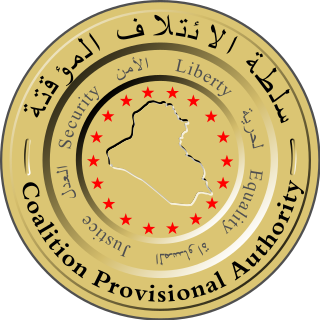Telecommunications in Iraq include radio, television, fixed and mobile telephones, and the Internet as well as the postal system.

The Coalition Provisional Authority was a transitional government of Iraq established following the invasion of the country on 19 March 2003 by U.S.-led Coalition forces. The invasion marked the fall of the Ba'athist regime led by Saddam Hussein.

Lewis Paul Bremer III is a retired American diplomat. He was the second de facto head of state of Iraq as leader of the Coalition Provisional Authority (CPA) following the 2003 invasion of Iraq by the United States, from May 2003 until June 2004.

The occupation of Iraq (2003–2011) began on 20 March 2003, when the United States invaded with a military coalition to overthrow Iraqi president Saddam Hussein and his Arab Socialist Ba'ath Party, and continued until 18 December 2011, when the final batch of American troops left the country. While the United States, the United Kingdom, and Australia were the largest contributors to the coalition, 29 other countries, such as Japan, were involved in the Iraq War in a lesser capacity. Additionally, several private military contractors took part in enforcing the occupation.

The Iraqi Governing Council (IGC) was the provisional government of Iraq from 13 July 2003 to 1 June 2004. It was established by and served under the United States-led Coalition Provisional Authority (CPA). The IGC consisted of various Iraqi political and tribal leaders who were appointed by the CPA to provide advice and leadership of the country until the June 2004 transfer of sovereignty to the Iraqi Interim Government.

The Revolutionary Command Council was the ultimate decision-making body in Ba'athist Iraq. Established after the 1968 Iraqi coup, It exercised both executive and legislative authority in the country, with the Chairman and Vice Chairman chosen by a two-thirds majority of the council. The Chairman was also then declared the President of Iraq and he was then allowed to select a Vice President. After Saddam Hussein became President of Iraq in 1979 the council was led by deputy chairman Izzat Ibrahim ad-Douri, deputy Prime Minister Tariq Aziz, and Taha Yassin Ramadan, who had known Saddam since the 1960s.
The Iraqi National Intelligence Service is a civilian intelligence agency whose constitutional duties is to collect intelligence, assess threats to national security, and advise the Iraqi government. The INIS is subject to legislative oversight and is attached to the Council of Ministers. It was created with the help of the CIA to replace the Mukhabarat, the main intelligence agency of the country.
The Central Criminal Court of Iraq, or CCCI, is a criminal court of Iraq. The CCCI is based on an inquisitorial system and consists of two chambers: an investigative court and a criminal court. The court was created by the Coalition Provisional Authority in 2003 to handle cases involving serious crimes such as governmental corruption, terrorism and organized crime that were previously handled by governorate level judges in the ordinary criminal courts. Candidates for the judiciary had to be an Iraqi national of high moral character and reputation, a non-member of the Ba'ath Party, demonstrate a "high level of legal competence", and sign an oath of office.
In May 2003, following the invasion of Iraq in March of that year, the Central Bank of Iraq-Development Fund for Iraq (DFI) account was created at the U.S. Federal Reserve Bank of New York at the request of the Coalition Provisional Authority (CPA) Administrator. A part of the fund has been transferred to Baghdad and Iraq, and the DFI-Baghdad account was opened at the Central Bank of Iraq "for cash payment requirements". The fund also eventually received money from seized and "vested" Iraqi bank accounts and funds seized by coalition forces. $650 million of this amount belongs to Uday Saddam Hussein, the older son of the former Iraqi president. The DFI have been disbursed mainly for "the wheat purchase program, the currency exchange program, the electricity and oil infrastructure programs, equipment for Iraqis security forces, and for Iraqi civil service salaries and ministry budget operations".
The Coalition Provisional Authority Program Review Board was composed of the senior personnel of the Coalition Provisional Authority, charged with the responsibility to review and make recommendations about the awarding of contracts to the administrator of the authority, Paul Bremer.
George B. Wolfe was born and raised in Columbia, South Carolina. In December 2023, he retired as a partner in the law firm of Nelson Mullins in Columbia, South Carolina. His practice was focused on representing foreign and domestic companies establishing or expanding operations in South Carolina.
The Constitution of the Republic of Iraq is the fundamental law of Iraq. The first constitution came into force in 1925. The current constitution was adopted on September 18, 2005 by the Transitional National Assembly of Iraq, and confirmed by constitutional referendum, held on October 15, 2005. It was published on December 28, 2005 in the Official Gazette of Iraq, in Arabic original, and thus came into force. An official translation into English for international use was produced in cooperation between Iraqi state authorities and the United Nations' Office for Constitutional Support. Since 2006, several proposals for adoption of various constitutional amendments were initiated. The Kurdish language is official at state level.
The Republic of Iraq's legal system is in a period of transition in light of the U.S.-led invasion in 2003 that led to the fall of the Ba'ath Party. Iraq does have a written constitution, as well as a civil, criminal and personal status law. In September 2008, the Iraqi Legal Database, a comprehensive database that makes all Iraqi positive law freely available to users online, was launched.
Coalition Provisional Authority Order 17 stated that Iraqi laws do not hold over contractors.
Coalition Provisional Authority Order Number 2: Dissolution of Entities signed by Paul Bremer on behalf of the Coalition Provisional Authority on 23 May 2003, disbanded the Iraqi military, security, and intelligence infrastructure of President Saddam Hussein. It has since become an object of controversy, cited by some critics as the biggest American mistake made in the immediate aftermath of the fall of Saddam Hussein and as one of the main causes of the rise of the Islamic State of Iraq and the Levant (ISIL/ISIS).

The Ministry of Defence is the cabinet-level ministry responsible for national defence in Iraq. It is also involved with internal security.
Economic reform in Iraq describes decisions by the Coalition Provisional Authority to dramatically change the economy of Iraq in the aftermath of the 2003 U.S.-led invasion.
De-Ba'athification refers to a policy undertaken in Iraq by the Coalition Provisional Authority (CPA) and subsequent Iraqi governments to remove the Ba'ath Party's influence in the new Iraqi political system after the U.S.-led invasion in 2003. It was considered by the CPA to be Ba'athist Iraq's equivalent to Nazi Germany's denazification after World War II. It was first outlined in CPA Order 1 which entered into force on 16 May 2003. The order declared that all public sector employees affiliated with the Ba'ath Party were to be removed from their positions and to be banned from any future employment in the public sector.

The Iraqi Civil Defense Corps was an Iraqi armed formation created by the Coalition Provisional Authority (CPA) which existed in 2003–2004. The ICDC was controlled by Combined Joint Task Force 7. The idea originated from the 101st Airborne Division as a means of using unemployed former Iraqi military personnel and tribal militias to supplement the scarce U.S. military footprint.
Coalition Provisional Authority Order 1: De-Ba'athification of Iraqi Society is the first of the 100 Orders imposed by the Coalition Provisional Authority during the Iraq War. Entering into force on 16 May 2003, it describes the objectives of the de-Ba'athification policy developed by the US Office of Special Plans.






